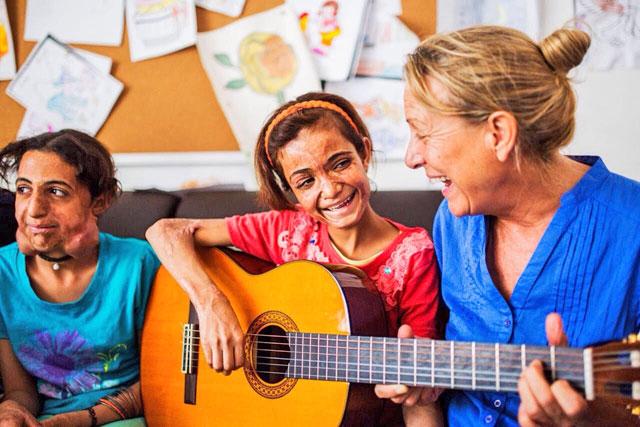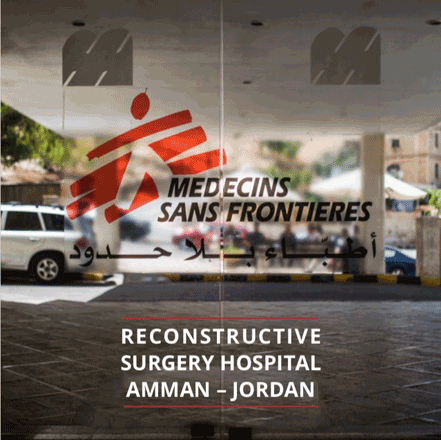You are here
Doctors Without Borders launches ‘Reconstructing Lives’ book in Arabic
By Mays Ibrahim Mustafa - Mar 02,2023 - Last updated at Mar 02,2023

Speakers during the launch of the Arabic version of the book ‘Reconstructing Lives: Victims of war in the Middle East and Médecins Sans Frontières’by MSF’s medical anthropologist Vanja Kovacic. (Photo courtesy of MSF)
AMMAN — Doctors Without Borders (MSF) on Thursday launched the Arabic version of the book “Reconstructing Lives: Victims of war in the Middle East and Médecins Sans Frontières” by MSF’s medical anthropologist Vanja Kovacic.
This took place during an event held at the Royal Cultural Centre in Amman, under the patronage of HRH Prince Hassan and in cooperation with the Ministry of Culture.
MSF Head of Communications Amman, Enas Abu Khalaf, noted that the “Reconstructing Lives” book, which is the result of three years of “tireless” work, features the experiences of MSF’s humanitarian workers in its Reconstructive Surgery Programme (RSP), which was established in Amman since 2006.
In his speech, Jordan’s former health minister, Saad Jaber, delivered remarks on behalf of Prince Hassan.
“For over 50 years, MSF… has provided holistic medical support to those affected by natural disasters, conflict, displacement and other situations of crisis, regardless of geography,” he said.
Since the inauguration of its first project in a conflict zone in Beirut in 1976, “His Royal Highness said that MSF has fulfilled its commitment to going where no one else will go and has worked to restore the dignity of the marginalised and the vulnerable worldwide,” he added.
The remarks also stressed that the “Reconstructing Lives” book “shows that the emotional weight accompanying loss… cannot be captured in numbers”.
“Through telling real life stories, it illuminates a multi-dimensional landscape of the suffering caused by conflict as well as the crucial role that humanitarian aid plays in alleviating it,” he added.
However, the prince stressed that there is a “paramount” need “to empower and enable all people in order to end the firefighting approach to humanitarian crises” and prevent perpetuating a dependency on aid.
Jaber also shared his experiences as a participant in five humanitarian missions with the Royal Medical Services. He noted that Jordan has been long committed to helping people in need of humanitarian aid across the world, regardless of ethnicity or religion.
Kovacic, the book’s author, began her remarks with a brief introduction on the RSP, which provides medical care to individuals from Yemen, Syria, Iraq and Palestine injured as a result of war.
She noted that her research as a medical anthropologist seeks to explore the social dimensions of diseases and the various elements that impact the well-being of patients.
According to Kovacic, the book is based on interactions with both MSF’s staff and patients, including over 100 interviews featuring recovery journeys that take the reader behind closed doors, outside of the hospital and into the domestic spaces of war victims.
According to the author, one question that the book explores is “How could people who experience severe violence and loss move on with their life?”. It does so by narrating stories of how patients found a way to frame their stories in a manner that gives them meaning and allows them to move forward.
The book’s main messages focus on the human capacity to go through and survive difficulties, the absurdity of war, which contributes to generating “waves of violence”, and the significance of “solidarity” throughout patients’ healing journeys, Kovacic added.
The also event included a number of panel discussions delving into the particularities of patient-centred care (PCC), medical anthropology and healthcare.
Speakers included MSF surgical regional adviser Rasheed Fakhri, President of the University of Jordan Natheer Obeidat, Head of Manson Unit MSF UK Chiara Lepora, MSF Person-Centred approach coordinator Lucie Eches, ICRC Health Coordinator in Jordan Nisreen Aljaridi and MSF RSP Mental Health Activity Manager Da’ed Almnezil.
Additionally, the event featured a book signing and the opening of a photo exhibition documenting some of MSF’s treatment journeys, also displaying paintings created by the organisation’s patients.
Related Articles
AMMAN — Médecins Sans Frontières/Doctors without Borders (MSF) is launching a photo exhibition on Tuesday that aims to share the organ
AMMAN — The medical assistance provided by Doctors Without Borders (MSF) is guided by the belief that “there’s no health without mental heal
AMMAN — At least 59 war-wounded Syrians, including 11 children between the ages of 3 and 14, “have been denied medical evacuation into Jorda













